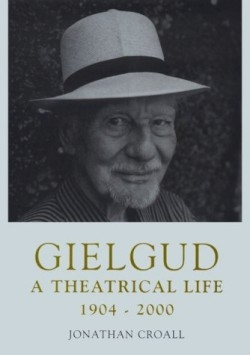Gielgud
A Theatrical Life 1904- 2000
“He came on to the stage with simplicity and a certain sort of beauty, and that beautiful diction, and of course, that fabulous voice, which was like a silver trumpet muffled in silk.” So said Alec Guinness of John Gielgud. He was certainly an early starter: in his nursery years, scarcely aware of who his relations Ellen Terry and Gordon Craig were, Gielgud was scripting, designing and producing playlets for his toy theater, as though in conscious preparation for an acting career that ran from 1921 to 1988.
Croall disabuses us of any belief that Gielgud simply advanced from strength to strength: great acting comes out of intelligence, integrity, intensity and industry, qualities Gielgud possessed in abundance. Not born with Olivier and Burton’s dramatic good looks and physical intensity, Gielgud had to draw posture, movement and projection out of an often awkward early self, refining and polishing every aspect of his self-presentation. Readers will fully sense Gielgud’s permanent anxiety, fearing failure and humiliation in the launching of new roles, concerned lest his Hamlet, Macbeth, or King Lear were adversely judged against other great actors’ benchmark interpretations and performances.
Croall’s analyses of Gielgud’s preparations for his extraordinary and catholic range of roles (whether from Shakespeare or Shaw, Chekhov or Wilde, Ibsen or Bennett) capture his most valuable quality: genuine humility. Croall emphasizes his responsiveness to direction; ever thoughtful, flexible, and willing to try a role one more way. He was the truest of professionals, backing the director and his colleagues in reshaping a faltering play, generously nurturing and strengthening weaker players. Yet even in his most brilliant performances, the critics’ praise was often qualified. Typically, they found his delivery brilliant but his physical presentation and movements less than perfect. Few ever denied the sheer intelligence with which Gielgud infused his roles; that and an impressive mastery and delivery of his lines were the living forces behind his greatness. In diction, tone, and nuance in delivery, Gielgud was a model for all.
It’s a confirmation of Gielgud’s intellectual strengths and artistic vision that he succeeded also as a director, designer, repertory theater manager, writer, lecturer, and even as an opera producer, staging with varying degrees of success The Trojans (Berlioz), A Midsummer Night’s Dream (Britten), and Don Giovanni. Croall provides perceptive insights into the hows and whys of Gielgud’s stage directing, in which success resulted from a demand for perfectionism (involving endless rethinking of the production) coupled with extreme empathy with and courtesy toward his actors. Croall points out that there was nothing superior or effete about the slender Gielgud: his wartime work in bringing theater to the troops, his acting seasons in the United States, and his worldwide tour with his Shakespearean readings, The Ages of Man, demonstrate workhorse stamina.
Weighing in at a hefty 608 pages, Croall’s book is far more than a straight cradle-to-grave biography of Gielgud’s distinguished sixty-seven year career; it is also a history of British theater in the 20th century, with generous asides to the theatrical scene in America. Readers will find it as exciting as a full scale, large caste, no-details-spared first-class production. Concurrently with a detail-rich presentation of Gielgud’s life work, Croall also fully captures the contemporary context. Production by production we enter the whole theatrical fray; the how and why of choosing plays; the clash of temperaments between actors and directors; the scorn and praise of critics; and, not least, the feuds, friendships and clashes of ego among leading actors. It’s clear that Guinness, Richardson, Olivier, Burton and other actors admired Gielgud (if at times begrudgingly), while Edith Evans, Sibyl Thorndike, Peggy Ashcroft, and Gwen Ffrangcon-Davies bore him something akin to love. Well they might: Gielgud neither upstaged them nor stole their thunder.
A cavalcade of movers and shakers parade across Croall’s pages. Among the many are Lilian Baylis offering shoestring but powerful Shakespeare at the across-the-Thames Old Vic (W.S. was not a fashionable West End draw); the pioneering director Komisarjevski, with his links to Chekhov and Stanislavski; the forceful director-critic-writer Harley Granville Barker, whose Prefaces to Shakespeare remain required reading; the powerful, somewhat sinister manager-impresario Binkie Beaumont; and the pugnacious Shaw.
Croall’s almost encyclopedic biography never lacks vivid, vibrant detail. Separate chronologies of Gilegud’s stage, film, TV, and radio roles and of plays he directed, plus an exhaustive biography and index make this the essential book on Gielgud.
Reviewed by
Peter Skinner
Disclosure: This article is not an endorsement, but a review. The publisher of this book provided free copies of the book to have their book reviewed by a professional reviewer. No fee was paid by the publisher for this review. Foreword Reviews only recommends books that we love. Foreword Magazine, Inc. is disclosing this in accordance with the Federal Trade Commission’s 16 CFR, Part 255.

